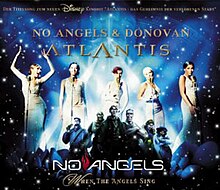Atlantis (song)
| "Atlantis" | ||||
|---|---|---|---|---|
 |
||||
| Single by Donovan | ||||
| from the album Barabajagal | ||||
| B-side |
|
|||
| Released |
|
|||
| Format | Vinyl record 7" | |||
| Recorded | May 1968 | |||
| Genre | Folk rock | |||
| Length | 4:58 | |||
| Writer(s) | Donovan Leitch | |||
| Producer(s) | Donovan, Gabriel Mekler | |||
| Donovan singles chronology | ||||
|
||||
| "Atlantis" | ||||
|---|---|---|---|---|
 |
||||
| Single by No Angels | ||||
| from the album Elle'ments | ||||
| Released | November 19, 2001 | |||
| Format | ||||
| Recorded | 2000 | |||
| Studio | Park Studios, (Tutzing, Germany) |
|||
| Genre | Pop | |||
| Length | 4:14 | |||
| Label |
|
|||
| Writer(s) | Donovan Leitch | |||
| Producer(s) | Leslie Mándoki | |||
| No Angels singles chronology | ||||
|
||||
"Atlantis" is a song written and recorded by Scottish singer/songwriter Donovan. It was released as a single in 1968 (see 1968 in music) and became a worldwide success; becoming a No.1 hit in Switzerland in 1969 (see 1969 in music), No.2 in Germany and South Africa, No.12 in Canada, and No.4 in Austria. In the United States, where it served as the b-side to "To Susan on the West Coast, Waiting," it reached No.7, whilst in the singer's native country the single managed only a modest No.23 placing.
In 2001, Donovan and German pop band No Angels re-recorded the track for the closing credits of the Walt Disney Feature Animation picture Atlantis: The Lost Empire (2001). Included on a concomitant album for the German-speaking music market, it was once more released as a single and re-entered the top five in Austria and Germany.
The introduction is a quiet monologue regarding the idea that Atlantis was a highly advanced antediluvian civilization, and that Atlantean colonists were the basis of the mythological gods of ancient times. Aware of their fate, the Atlanteans sent out ships to carry their masters to safety, and these people were responsible for bringing civilization and culture to primitive humans. When the song begins in earnest, it conveys the message that the singer's true love may be in Atlantis. The overall theme is common for the 1960s: fanciful mythology as the symbol of the counterculture movement, with the hope that true love will be found if ever Atlantis can be reached.
...
Wikipedia
